The Nursing Home Law Center is committed to providing the legal resources necessary to hold negligent facilities accountable.
Arizona Nursing Home Abuse Lawyer

Licensed in Arizona
Nursing home abuse is a serious issue impacting elderly residents in Arizona, with vulnerable adults facing mistreatment that jeopardizes their safety. Abuse can include physical harm, financial exploitation, neglect, and verbal abuse, causing significant harm to victims and their families.
Seeking legal help from an experienced Arizona nursing home abuse attorney is crucial for justice. At Nursing Home Law Center, we navigate complex laws, gather evidence, and advocate for victims, ensuring they receive fair compensation. Legal protection is especially important in growing communities where facility oversight may vary. If your family is dealing with negligence in the East Valley, consulting a Chandler Nursing Home Abuse Lawyer can help you secure the justice your loved one deserves. By hiring a skilled attorney from our team, families can protect their loved ones and hold responsible parties accountable.
Types of Cases Handled by Our Arizona Nursing Home Abuse Lawyers
Nursing home abuse refers to any form of mistreatment or neglect that results in harm or risk to elderly residents in nursing homes and assisted living facilities. This mistreatment can stem from intentional abuse or neglect by staff members, leading to significant physical, emotional, and financial harm.
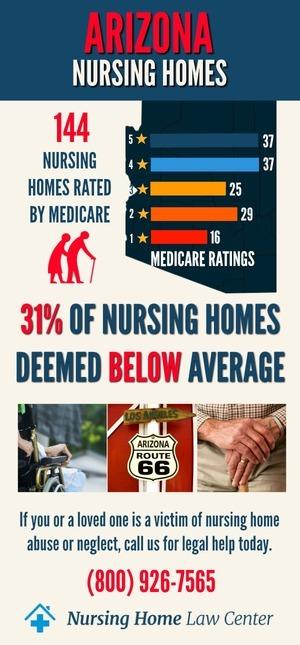
Our Arizona nursing home abuse lawyers are adept at handling various types of abuse cases, including:
- Physical abuse involves using force that causes bodily injury, pain, or impairment, such as hitting, slapping, pushing, kicking, or improperly using restraints. For example, if a resident is struck by a staff member, resulting in bruises or fractures, or is improperly restrained, leading to pressure sores or restricted circulation.
- Mental and emotional abuse includes actions or words that cause emotional distress, fear, or mental anguish, such as yelling, threatening, humiliating, or isolating residents. An example is when a caregiver uses derogatory language to belittle a resident or threaten them with harm.
- Sexual abuse involves any non-consensual sexual contact with a nursing home resident, ranging from inappropriate touching to rape. For instance, a staff member engaging in sexual activities with a resident without their consent can have devastating psychological and physical effects on the victim.
- Medical malpractice occurs when nursing home staff fail to provide adequate medical care, leading to injury or harm to residents. This can include misdiagnosis, medication errors, or failure to treat medical conditions appropriately. For example, bedsores can develop when nursing home staff neglects to reposition immobile residents, leading to infections.
- Negligence involves failing to provide necessary care and services to meet a resident’s basic needs, resulting in harm or risk of harm. This can include inadequate nutrition and lack of hygiene, and care. An example is elopement, where a cognitively impaired resident, such as someone with dementia, wanders away unsupervised, potentially putting themselves in danger.
- Financial abuse, or financial exploitation, is the illegal or unauthorized use of a resident’s funds, property, or assets. This can include stealing money, forging signatures, or coercing residents to alter financial documents. For example, a caregiver using a resident’s credit card for personal purchases without permission and depleting their savings.
- Wrongful death occurs when abuse or neglect leads to a resident’s death. An example is when a resident dies from untreated infections or injuries due to neglectful care.
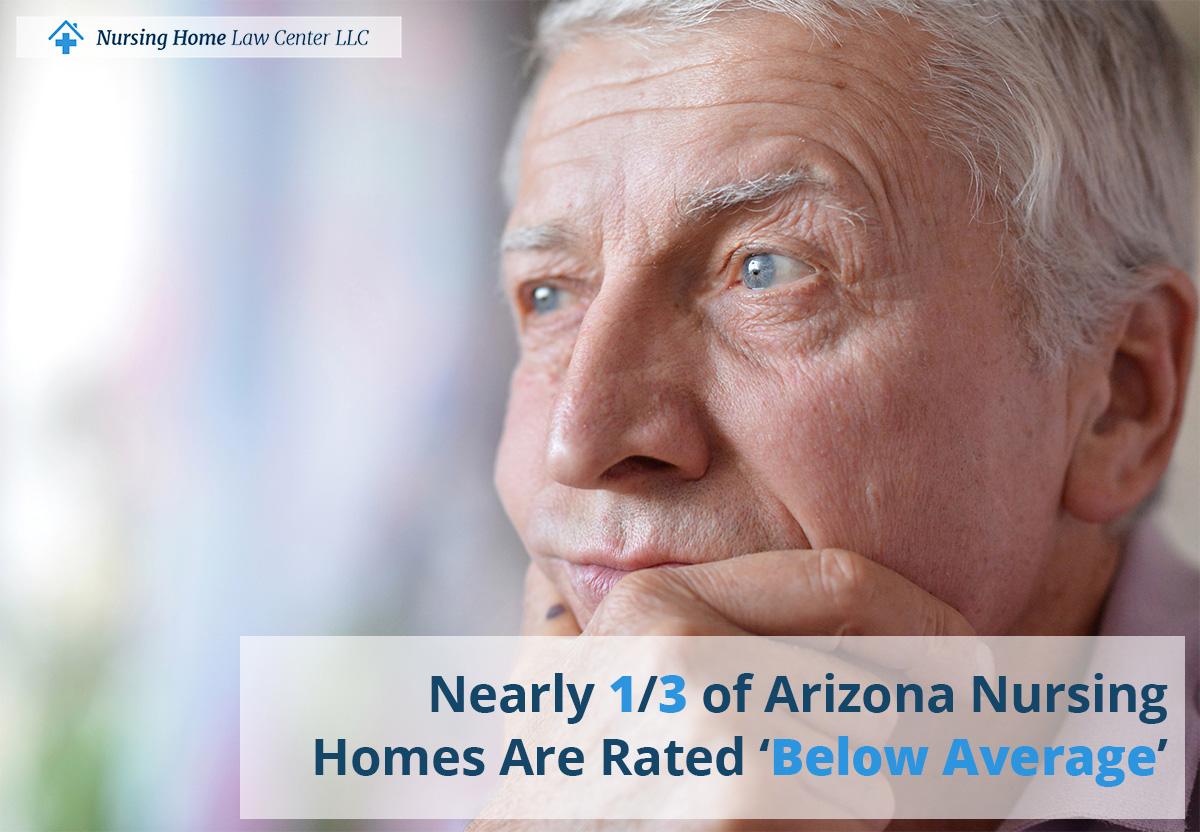
Understanding Your Legal Rights
Nursing home and assisted living facility residents have specific legal rights designed to protect them from abuse and neglect. These rights are enshrined in both federal and state laws to ensure that residents receive the care, dignity, and respect they deserve.
The Nursing Home Reform Act of 1987 is a pivotal federal government law that established a set of rights for nursing home or assisted living facility residents. This act mandates that nursing homes receiving Medicare and Medicaid funds provide services that maintain or improve each resident’s physical, mental, and psychosocial well-being.
Key provisions include:
- The right to be free from abuse and neglect
- The right to proper medical care
- The right to participate in their care
- The right to privacy and confidentiality
In addition to federal protections, the state of Arizona has passed laws emphasizing the safety and rights of nursing home residents, enforcing standards for care and outlining procedures for reporting and investigating abuse and neglect. The Arizona Department of Health Services oversees the compliance of nursing homes with these regulations.
Filing a nursing home abuse lawsuit can be initiated by the victim or their legal representative. In cases where the resident is incapacitated, family members or a designated power of attorney can file a claim on their behalf.
Additionally, in instances of wrongful death due to abuse or neglect, the resident’s family members may file a wrongful death claim seeking justice and compensation.
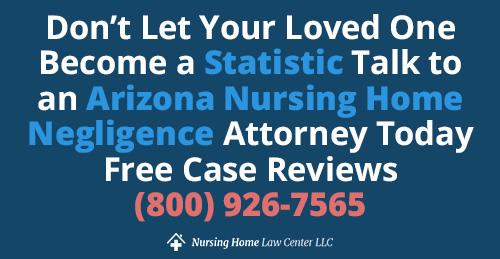
Liability for Nursing Home Abuse and Neglect Cases
In nursing home abuse cases, multiple parties can be held liable for the harm inflicted on residents. Identifying all responsible parties is crucial to ensuring accountability and securing compensation for victims and their families.
Examples of liable parties:
- Nursing Home Staff: Individual staff members, such as nurses, aides, or caregivers, can be directly liable if they engage in abusive behavior or neglect residents. This includes acts of physical, emotional, or sexual abuse, as well as failing to provide necessary care, leading to conditions like bedsores or malnutrition.
- Facility Management: Facility management can be held liable for abuse or neglect if it results from inadequate training, poor staffing levels, or failure to implement proper oversight and safety measures.
- Corporate Owners: The corporate owners of nursing homes may be liable if systemic issues, such as cost-cutting measures that compromise care quality, contribute to abuse or neglect. This can include policies that prioritize profit over resident safety, resulting in chronic understaffing or inadequate resources for proper care.
- Third-Party Contractors: In some cases, third-party contractors, such as maintenance or security personnel, may be responsible if their negligence or misconduct contributes to the abuse or neglect of residents. For example, if a security company fails to implement effective safety protocols, allowing a resident to elope from the facility, they may share liability.
- Medical Providers: Healthcare professionals who provide medical care to elderly residents can also be liable for malpractice or negligence. This includes doctors or nurses who fail to diagnose or properly treat medical conditions, resulting in harm to the resident.
Understanding the potential liability of various parties is essential for pursuing a comprehensive elder abuse claim. An experienced Arizona nursing home abuse attorney from our team can help investigate the case, identify all responsible parties, and hold them accountable for their actions or negligence.
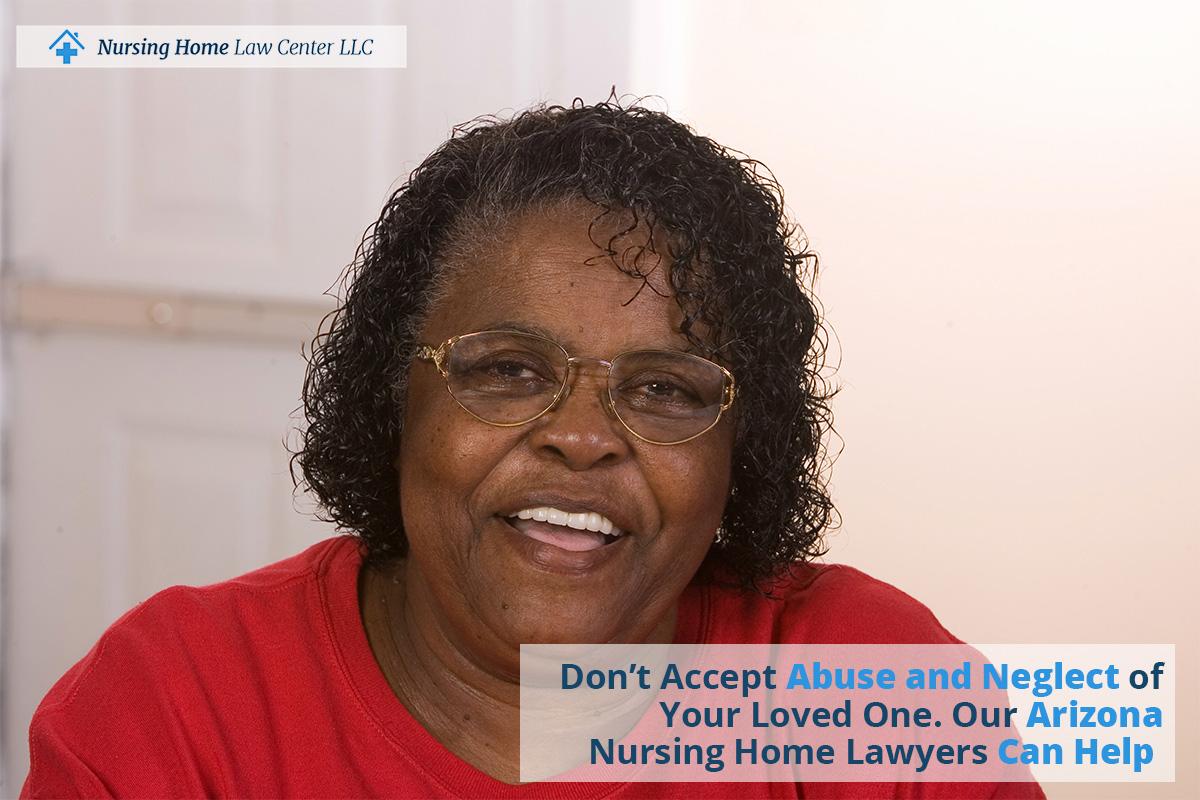
Warning Signs of Nursing Home Abuse
In Arizona, there are 142 Medicare-certified nursing facilities, with 51 facilities (35.9%) rated as below or much below average overall. Specifically, 61 homes (43%) fall short in health inspections, and 65 homes (45.8%) have inadequate staffing levels. These concerning statistics are particularly evident in major urban centers where facilities often operate at full capacity. For those living in the state capital, a Phoenix Nursing Home Abuse Lawyer can provide the localized expertise needed to investigate these underperforming institutions. 11 facilities (7.7%) are rated poorly in quality measures. [1]
The worst-rated nursing homes in Arizona include:
| Archie Hendricks Senior Skilled Nursing Facility | Arizona State Veteran Home-Phx |
| Desert Cove Nursing Center | Desert Haven Care Center |
| Desert Highlands Care Center | Desert Peak Care Center |
| Dr Guy Gorman Sr Care Home | Haven of Cottonwood |
| Haven of Globe | Haven of Sedona |
| Haven of Show Low | Life Care Center of Tucson |
| Mountain View Care Center | Mountain View Manor |
| Oasis Pavilion Nursing & Rehabilitation Center | Palm Valley Post Acute |
| Rim Country Health & Retirement Community | Sandstone Estates Rehab Centre |
| Santa Rosa Care Center | Silverwood Post Acute |
| Winslow Campus of Care |
Nursing home abuse can manifest in various ways, and recognizing the warning signs is crucial for protecting senior citizens from harm. Family members and loved ones should remain vigilant and aware of these indicators to ensure the safety and well-being of elderly residents. Here are some common signs of nursing home abuse, along with examples:
- Unexplained Injuries: Physical signs such as bruises, cuts, burns, or fractures that cannot be adequately explained may indicate physical abuse.
- Bedsores or Pressure Ulcers: These sores develop when a nursing home facility fails to regularly reposition a vulnerable adult, suggesting neglect or inadequate care.
- Weight Loss or Dehydration: Sudden weight loss or signs of malnutrition and dehydration may indicate nursing home neglect or inadequate nutrition.
- Poor Hygiene: Unkempt appearance, dirty clothing, or unsanitary living conditions suggest a lack of proper care and attention.
- Changes in Mood or Behavior: Nursing home residents who exhibit sudden changes in mood, such as increased agitation, withdrawal, or depression, may be experiencing emotional or verbal abuse.
- Fear of Staff Members: If a nursing home resident seems fearful or anxious around certain nursing home staff members, it may indicate abuse or mistreatment.
- Social Withdrawal: Residents who isolate themselves or show reluctance to participate in activities may be experiencing nursing home abuse or neglect.
- Bruising or Injuries in Sensitive Areas: Unexplained injuries or bleeding in the genital area can be indicative of sexual abuse in nursing homes.
- Torn or Stained Underclothing: Clothing that is torn or stained may suggest inappropriate contact or sexual assault.
- STDs or Infections: Diagnoses of sexually transmitted diseases or unexplained infections can indicate sexual abuse.
- Unexplained Financial Transactions: Sudden changes in bank account balances, withdrawals, or transfers may indicate financial exploitation.
- Missing Personal Belongings: The disappearance of personal items, such as jewelry or cash, can be a sign of theft or exploitation.
- Changes in Legal Documents: Unexpected changes to wills, powers of attorney, or financial documents may suggest coercion or manipulation.
- Worsening Medical Conditions: Conditions that deteriorate due to lack of treatment or incorrect medication administration may indicate medical neglect or malpractice.
- Frequent Hospitalizations: Repeated hospital visits for preventable conditions or injuries can suggest nursing home neglect or inadequate care.
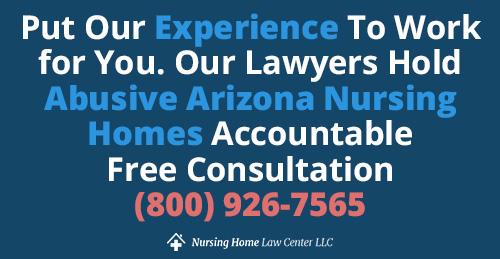
What to Do If You Suspect Abuse
If you suspect that a loved one is experiencing nursing home abuse, it is essential to take immediate and appropriate action to ensure their safety and well-being.
Here are the steps you should follow:
- Call 911: If you believe that a resident is in immediate danger or has suffered a serious injury, call 911 immediately. Emergency responders can provide urgent medical treatment and ensure the safety of the resident.
- Report the Nursing Home Abuse: Notify the nursing home administrator or management about your concerns. It is important to document your observations and report any specific incidents or patterns of behavior that indicate nursing home abuse or neglect. This formal complaint can prompt internal investigations and corrective actions.
- File a Complaint with Your Local Ombudsman’s Office: Contact your local Long-Term Care Ombudsman’s office to file a complaint. Ombudsmen are advocates for nursing home residents and can help investigate complaints, mediate conflicts, and ensure that facilities comply with federal and state regulations. They work to protect residents’ rights and improve the quality of care in nursing homes.
- Contact a Nursing Home Abuse Lawyer: Reach out to an experienced attorney to discuss your concerns and explore legal options. A lawyer can help you understand your rights, investigate the abuse, and take action against those responsible, guiding you through the legal process.
Damages You Can Recover Through a Nursing Home Abuse Claim
When pursuing an elder abuse claim, victims and their families may be entitled to recover various types of damages. These damages are generally categorized into economic and non-economic damages, each serving to compensate for different aspects of the harm suffered.
Economic Damages
Economic damages are tangible financial losses that can be quantified and documented. Examples include:
- Medical Bills: Costs incurred for medical treatment related to nursing home neglect or abuse, such as hospital bills, medication, physical therapy, and ongoing care.
- Rehabilitation Costs: Expenses for rehabilitative services required to aid recovery, such as occupational therapy or counseling.
- Relocation Expenses: Costs associated with moving the resident to a safer facility or home environment if necessary.
- Lost Wages: Compensation for lost wages and income if a family member had to take time off work to care for the abused resident or manage their affairs.
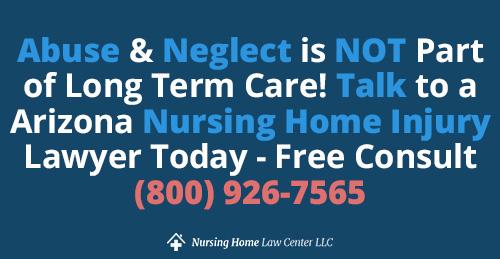
Non-Economic Damages
Non-economic damages compensate for intangible losses that are not easily quantifiable but significantly impact the victim’s quality of life. Examples include:
- Pain and Suffering: Compensation for physical pain and emotional distress experienced as a result of the abuse or neglect.
- Emotional Distress: Damages for psychological trauma, anxiety, depression, or other emotional suffering caused by the abuse.
- Loss of Enjoyment of Life: Compensation for the victim’s reduced ability to enjoy daily activities and experiences due to the abuse.
- Loss of Companionship: Damages for the loss of relationship quality and companionship between the resident and their family members.
Punitive Damages
In some cases, punitive damages may also be awarded. These are intended to punish particularly egregious behavior by the responsible parties and deter similar conduct in the future. Punitive damages are typically awarded when the nursing home neglect or abuse is proven to be malicious, willful, or grossly negligent. The loss of a family member due to avoidable medical complications is a profound tragedy. A Peoria, AZ Nursing Home Abuse Lawyer can assist you in filing a wrongful death claim to seek compensation for the emotional and financial toll on your family.
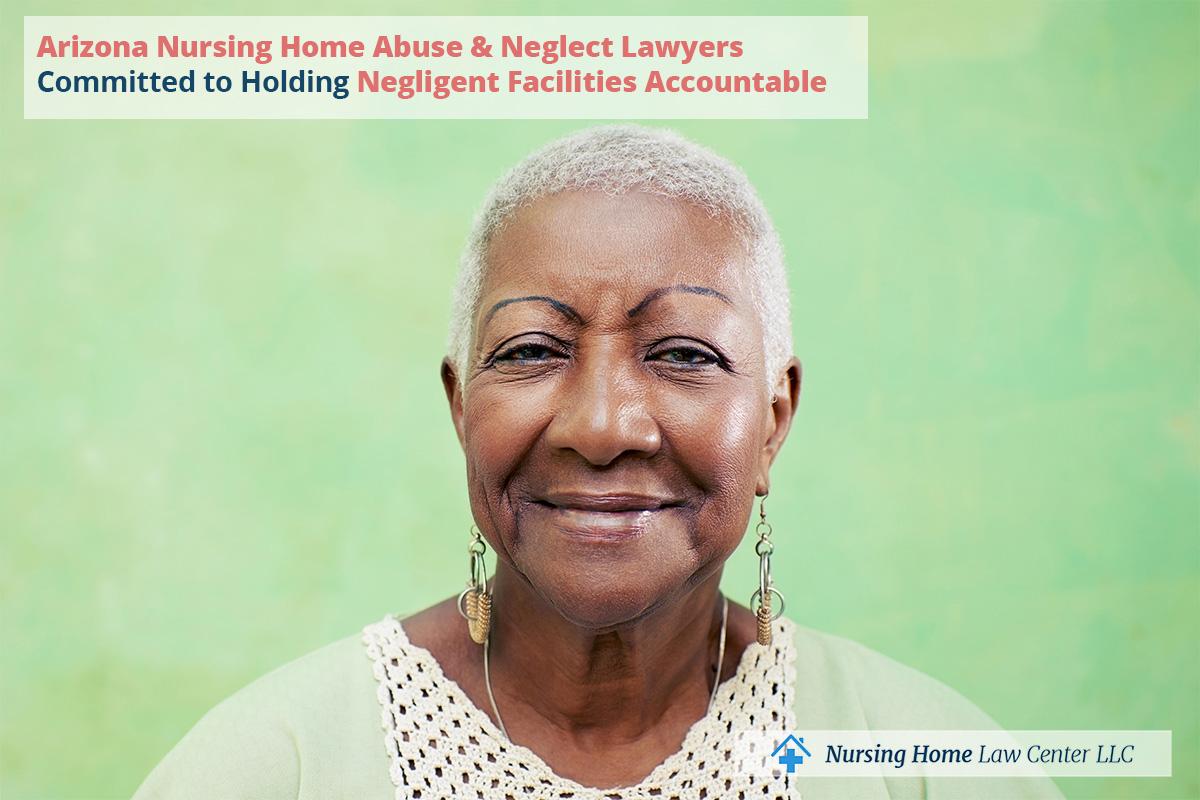
You Have Limited Time to Take Legal Action in Arizona
The statute of limitations sets a specific time frame within which you must file a nursing home abuse lawsuit in Arizona courts. Generally, victims and their families have two years from the date of the abuse or injury to initiate legal action. Failing to file within this period can result in losing your right to seek compensation and hold responsible parties accountable.
Given these strict deadlines, it is crucial to act promptly if you suspect nursing home abuse. Contacting an experienced Arizona nursing home abuse attorney as soon as possible can help ensure that your claim is filed within the legal time limits, preserving your rights and maximizing your chances of a successful outcome. Legal deadlines in Arizona are strict, and waiting too long to report mistreatment can jeopardize your case. If you are located in the southwestern part of the state, a Yuma Nursing Home Abuse Lawyer can help you gather evidence before records are lost or altered by the facility.
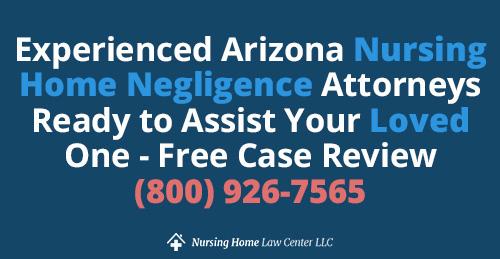
Contact an Arizona Nursing Home Abuse Attorney Today!
At Nursing Home Law Center, our experienced legal team is dedicated to advocating for nursing home abuse victims and their families. With a proven track record of handling complex cases, we are committed to securing justice and fair compensation for those affected by nursing home mistreatment. Our attorneys provide comprehensive support, from thorough case investigations to aggressive negotiation and representation in court if necessary.
We offer a free consultation to evaluate your case and discuss your legal options. Our contingency fee arrangement ensures that you can hire a nursing home abuse lawyer without worrying about upfront legal costs. Our focus is on achieving the best possible outcome for your nursing home abuse case while providing compassionate and transparent support throughout the process.
Call us at (800) 926-7565, or fill out our contact form
References: [1] Medicare
Arizona Nursing Home Abuse Lawyers
Arizona nursing home Abuse lawyers are here to help families across the state pursue justice for their loved ones. From Chandler to Flagstaff, Gilbert, Kingman, Mesa, Phoenix, Tucson, and Yuma, our experienced legal team is committed to holding nursing homes accountable. Contact a lawyer in Arizona today to discuss your case and get the support you deserve.

